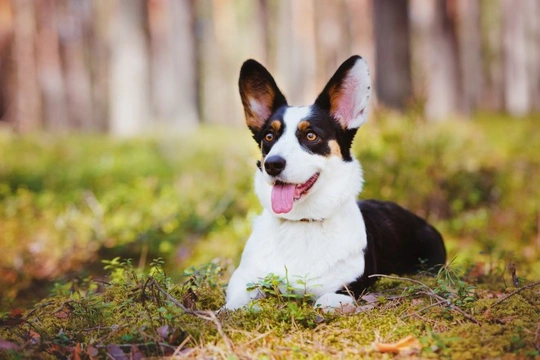
Cardigan Welsh corgi hereditary health and health testing
The Cardigan Welsh corgi is a small, compact native British breed that originates from the historic county of Cardigan in Wales, and was historically used as a working, herding dog for use with sheep. Often just referred to as the corgi rather than by their full breed name, the Cardigan Welsh corgi is one of two breeds that fall under the corgi heading, the other of which is the Pembroke. Despite their similar names and appearances, the two breeds were in fact developed separately, and are classed as two distinct breeds in their own rights.
Both the Cardigan and the Pembroke Welsh corgi are today classed as relatively rare, and both dogs make The Kennel Club’s annual list of vulnerable native breeds, which are breeds for which less than 300 puppies are registered each year. Even so, the Cardigan is much less common than the Pembroke, and if you manage to meet one, you can consider yourself fairly lucky!
The Cardigan Welsh corgi is slightly larger than the Pembroke, and also has larger ears and a longer tail. They can also be seen in a wider range of colours.
If you are interested in owning a Cardigan Welsh corgi, you might have to travel some distance and join a waiting list for a puppy! However, if you are committed to buying a dog of the breed, before you make your purchase, it is important to do plenty of research into the breed first, including finding out about their general health and any known health problems. We will cover these factors in more detail within this article.
Cardigan Welsh corgi longevity
The average lifespan of the Cardigan Welsh corgi is 12-15 years, which is considered to be a slightly higher than average lifespan when compared to all dog breeds of a similar size and build. This also reflects the fact that the Cardigan Welsh corgi was historically a working dog breed, and so tends to be robust, fit and healthy.
Genetic diversity
The coefficient of inbreeding statistic for the Cardigan Welsh corgi is 10%, which is a good deal higher than the accepted ideal of 6.25% or lower that is advised for pedigree dog breeds. In large part, this figure reflects the fact that the breed is fairly uncommon, and as such, there is a limited gene pool of available dogs for breeding.
However, breeders of the Cardigan Welsh corgi are advised to reduce the coefficient of inbreeding statistic within their own breed lines where possible.
Conformation
The Cardigan Welsh corgi’s long back and short legs is actually caused by a genetic mutation that causes chondrodysplasia, a type of canine dwarfism. The shape and build of the breed can mean that the legs are slightly bowed, and the long spine in comparison to the leg length can potentially lead to problems with the spine and back.
Health testing for the Cardigan Welsh corgi
The British Veterinary Association and The Kennel Club make recommendations for pre-breeding health screening and testing for pedigree breeds, in order to attempt to breed hereditary health problems out of the breed as a whole. For the Cardigan Welsh corgi, the following health testing schemes are in place:
- Hip score testing, with the breed’s mean hip score being 24. This figure is significantly higher than a healthy norm, placing dogs of the breed at a heightened risk of developing hip dysplasia. Potential breeding stock should receive a hip score much lower than 24, in order to be considered as viable parents.
- Eye testing for glaucoma, and progressive retinal atrophy.
- DNA testing can also be performed for progressive retinal atrophy.
- DNA testing for the merle gene, a coat colour that can lead to a range of health problems.
- DNA testing for SCID, or severe combined immunodeficiency syndrome.
- DNA testing for CDRM or degenerative myelopathy of the spinal cord.
Other health issues
The conditions outlined above are disorders that both have a known hereditary element to them, and that can be tested for. As well as this, they are considered to present commonly enough within the Cardigan Welsh corgi breed as a whole as to pose a significant health risk to the breed overall. However, as well as these conditions, the Cardigan Welsh corgi may also have a potentially elevated predisposition to certain other health issues too, but for which no pre-breeding health screening is currently available. Such conditions include:
- Epilepsy, which may have a hereditary element to it, but is often idiopathic.
- Urolithiasis, or a propensity to developing bladder crystals and stones.
- Intervertebral disc disease, a particular risk due to the breed’s long backs.
- Cataracts of the eyes, particularly in old age.
- Lens luxation of the eyes.
- Digestive problems such as sensitivities to certain foods.
- Patent ductus arteriosus, a type of heart disease.



